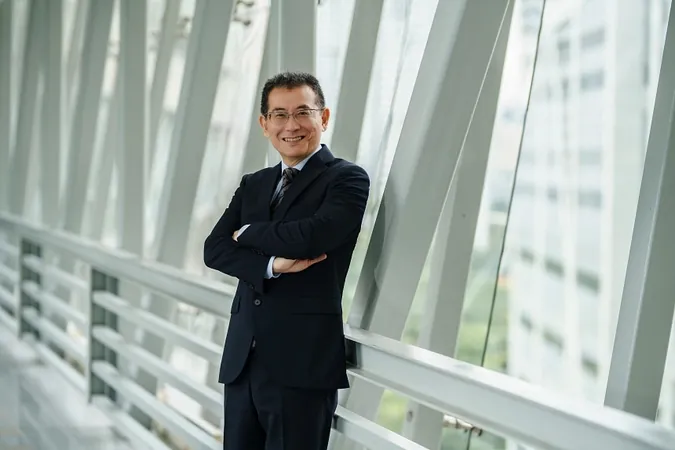
From Marine Biology to Genetic Breakthroughs: Meet the Man Revolutionizing Asian Health
2024-11-24
Author: Jia
Introduction
SINGAPORE – At 61, Professor Liu Jianjun stands out as a leading human geneticist hailed for his groundbreaking research on diseases that disproportionately affect Asians and for pioneering advancements in their treatment outcomes.
A Unique Journey
Interestingly, Liu’s journey into the world of genetics was not straightforward. Initially, he pursued a path in marine biology. Hailing from China, he faced financial constraints that made it imperative to secure a scholarship for his studies abroad. He earned his master’s degree in marine biology, focusing on environmental science, believing it was his ticket to an international education.
However, after a year into his doctoral studies at Duke University’s coastal campus in North Carolina in 1991, Liu realized his interest was waning. "I found that the field was heavily focused on environmental protections and species conservation, which no longer captivated me," he recalled. Eager for a shift, he sought to delve into numbers and patterns, sparking his eventual pivot to genetics.
A Shift to Genetics
Liu’s new direction coincided with the burgeoning field of human genetics during the 1990s. He reached out to a professor specializing in Drosophila genetics, successfully convincing her to mentor him. His five years of research culminated in a PhD in 1997, but it was a poignant question from his mother about his fascination with fruit flies that motivated him to pursue more impactful research in human health.
Career at Columbia University
Soon after, he joined the prestigious Columbia University in New York, focusing on genetic psychiatry, specifically on schizophrenia. Under the mentorship of renowned geneticist Conrad Gilliam, he aimed to explore how human genes influence diseases, thus establishing a direct impact.
Relocation to Singapore
After a few years, Liu felt he and his family did not truly belong in New York City despite his professional successes. Fate intervened when he was invited to host a visiting delegation from Singapore, including Mr. Philip Yeo, then chairman of the Economic Development Board. This fortuitous meeting led to his employment at the Genome Institute of Singapore (GIS) in 2002, where he immediately turned his attention to the often-ignored realm of Asian genetics.
Research on Nasopharyngeal Cancer
One of Liu’s key research areas is nasopharyngeal cancer, known colloquially as "Cantonese cancer," which is notably more prevalent in southern China. His investigation revealed a specific strain of the Epstein-Barr virus that significantly increases cancer susceptibility – individuals carrying this strain are 11 times more likely to develop the disease than non-carriers.
Genome Sequencing Initiative
In 2017, he launched an ambitious initiative to sequence the entire genomes of 5,000 Singaporeans, a precursor to an even larger project targeting 100,000 genomes by 2025. The aim? To identify genetic risk factors for nasopharyngeal cancer among Southeast Asians, improving early diagnosis and paving the way for personalized treatment options.
Recognition and Advice
For his contributions, Liu was awarded the President’s Science Award in 2020, a testament to his dedication and impact in the field. As he advises younger researchers, "Sometimes you must seize whatever opportunities you find, make compromises, and work diligently until you discover the right path. If you see a chance to leap, take it—but never give up."
Conclusion
As Singapore continues to build its reputation as a global hub for genetic research, Professor Liu Jianjun remains a guiding force, inspiring future generations in the pursuit of scientific discovery and improved public health outcomes across Asia. Will Liu's work lead to further breakthroughs? Only time will tell, but one thing is certain: the world of genetics is in thrilling hands.




 Brasil (PT)
Brasil (PT)
 Canada (EN)
Canada (EN)
 Chile (ES)
Chile (ES)
 España (ES)
España (ES)
 France (FR)
France (FR)
 Hong Kong (EN)
Hong Kong (EN)
 Italia (IT)
Italia (IT)
 日本 (JA)
日本 (JA)
 Magyarország (HU)
Magyarország (HU)
 Norge (NO)
Norge (NO)
 Polska (PL)
Polska (PL)
 Schweiz (DE)
Schweiz (DE)
 Singapore (EN)
Singapore (EN)
 Sverige (SV)
Sverige (SV)
 Suomi (FI)
Suomi (FI)
 Türkiye (TR)
Türkiye (TR)